READY TO INNOVATE

















It is my great pleasure to welcome you to Lethbridge College’s fifth annual applied research report, covering our activities for the 2021-22 academic year. It has certainly been an exciting year for the Centre for Applied Research, Innovation and Entrepreneurship (CARIE) as we have continued to expand our team and grow our capacity for applied research that supports our region, province and country.
If you’ve been following our growth over the past few years, you know it’s been nothing short of explosive. Just a few years ago we were conducting less than $2 million per year in externally funded applied projects with industry partners and clients. This year, we are happy to report $8 million in externally funded projects. We have grown from a team of less than 10 to nearly 80, encompassing five unique applied research themes.
Such rapid expansion came with a need to focus on our people, places and processes. We needed to reimagine the support system we had in place for our applied researchers and so, we created an operations team to oversee our facilities and processes. Together with the researchers, the ops team is refining our areas of expertise and service offerings for maximum impact focused on pre-commercial validation for commercial application.
Enhancing our research infrastructure capacity was also a top priority. Utilizing funding secured in the previous fiscal year, we completed construction on the labs that support the Spatial Technologies Applied Research and Training (START) Centre and built a grain drying site on our Research and Demonstration Farm for a large province-wide project undertaken by the Advanced Post-harvest Technology Centre (APHTC). Our Mueller Irrigation Group’s projects reaped the benefits of a second successful field season on our farm. Our on-campus greenhouse, the Centre for Sustainable Food Production (CSFP), officially opened and we planted our first crop. At peak, we harvested 3,000 long English cucumbers per week. That’s a lot of cukes! If you combine that with the tomatoes and strawberries that we’re growing in the Brooks Research and Production Greenhouse with Sunterra, you can make one delicious, sustainably grown salad! We hope you enjoy reading our stories from this year.
Megan Shapka, MEd Director, Applied Research Operations megan.shapka@lethbridgecollege.ca 403-320-3202 ext. 5535

The 2021-22 academic year saw the creation of a new division at Lethbridge College – Research and Partnerships – and with that, my appointment as vice president – research and partnerships and Megan Shapka’s appointment as the inaugural director of applied research operations. Megan oversees the people, places and processes that support the activities of the research programs, and I oversee the researchers, programs and their respective teams.
We have continued our growth in agriculture, food and environment as well as in business and technology, with extensive grants and fee-for-service contracts, and we have expanded into other research themes as well. Mike McCready, who completed his three-year term as the President’s Applied Research Chair in Virtual and Augmented Reality, secured significant funding that supported his transition to an industry research advisory role as the principal industry contact for the Spatial Technologies Applied Research and Training (START) Centre. Dr. Kirsten Fantazir was appointed to a three-year term as the President’s Applied Research Chair in Public Safety and will take the role of leading a team and developing a research program in support of public safety. That work will be supported by a $1 million federal research grant.
With a number of high value funding proposals submitted and many more in progress, our growth is expected to continue as we strive to reach our goal of being ranked in the top 10 of Canadian research colleges and bringing in $10 million in external funding by 2025. The impact this work will have in our community, region and country is significant as we support our local industries, help drive our economy and provide valuable opportunities for faculty and students.
Kenny Corscadden, PhD, MBA, PEng, FIET
Vice President, Research and Partnerships kenny.corscadden@lethbridgecollege.ca 403-320-3202 ext. 5223
Located on the traditional lands of the Blackfoot Confederacy, Lethbridge College is committed to honouring the land from a place of knowing. We honour the Siksikaitsitapi as both the traditional and current Land Keepers of this area, and we welcome all First Nations, Métis, Inuit and non-Indigenous peoples who call Blackfoot territory their home.

College’s first President’s Applied Research Chair in Public Safety works to strengthen policing and public safety in Canada
Where others see an obstacle, Dr. Kirsten Fantazir (General Studies 1999) sees an opportunity.
For example, while working as an instructional designer early in her time at Lethbridge College, she was tasked with creating online versions of courses within the college’s Justice Studies diploma and degree programs.
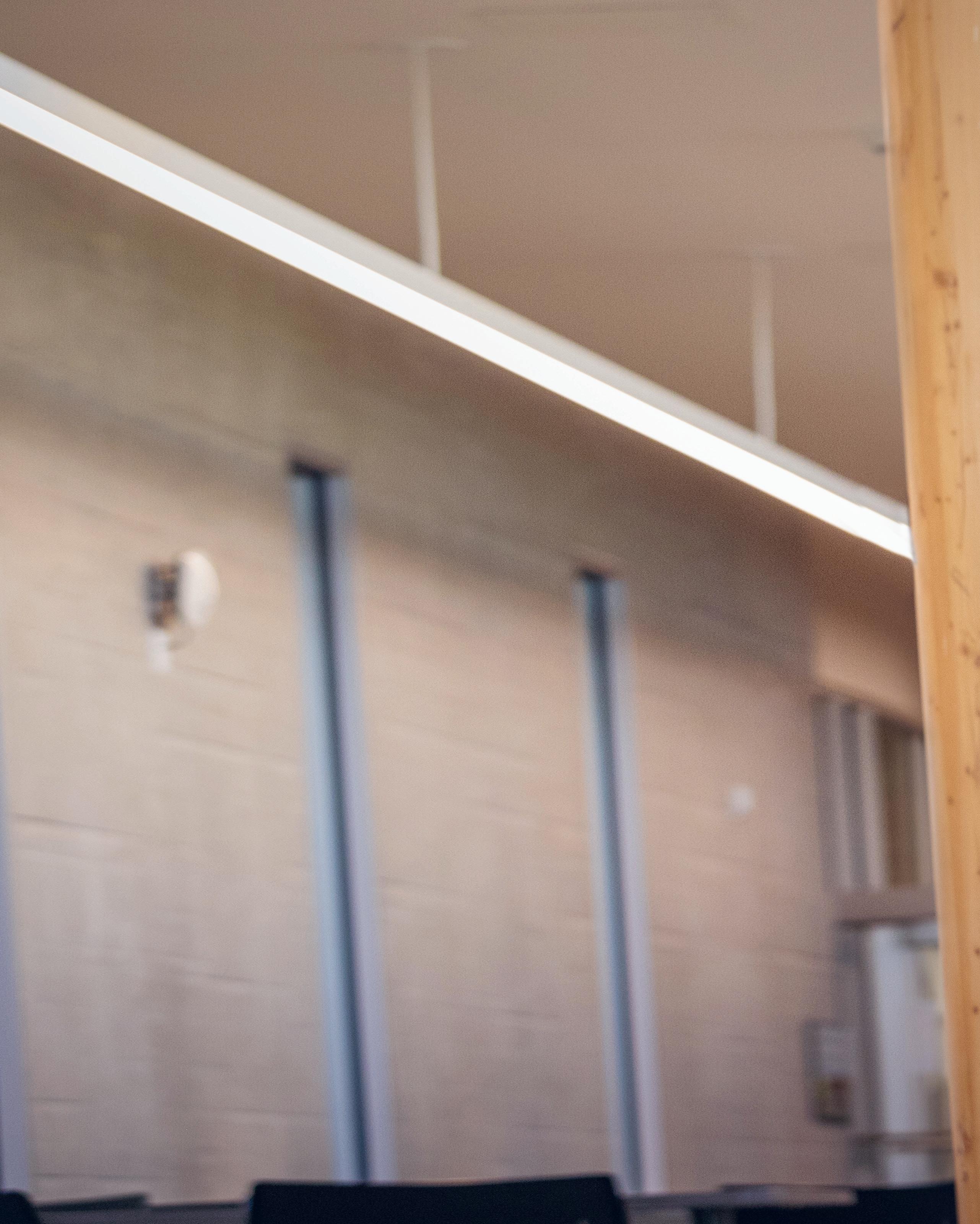
“There were a lot of naysayers,” Fantazir remembers, “so, we really had to be creative.” Like when she had to develop an interviewing course, where the instructor didn’t believe some of the core elements, such as nonverbal cues, could possibly translate to an online, interactive experience. Some designers would be skeptical, but she had a different reaction. “That was super exciting for me. I’m like, ‘let’s do it! Let’s see what we can create to simulate the on-campus experiences.’”
Fast forward through months of development, trials and implementation, and “the most rewarding thing was him saying, ‘OK, the experience for the students and me was similar to the impact of teaching face-to-face,’” says Fantazir. “So, we started to win people over that online learning could be effective.”
That commitment to data-driven decision making, working with people on a one-to-one level and finding solutions where they didn’t exist before made Fantazir a perfect selection as Lethbridge College’s first President’s Applied Research Chair in Public Safety. Bolstered by a $1-million federal research grant, Fantazir and other college researchers, most from the School of Justice Studies, will engage with industry partners across policing, corrections, and courts and their associated community service providers to undertake research projects aimed at strengthening policing and public safety in Canada.
“I’m excited by the opportunities in the field of public safety,” says Fantazir, who began her role during the summer of 2022. “There’s a lot of information and data out there; however, one of the challenges we often have is how can we use this information to help our partners make well-informed decisions and policies.”
Working closely with industry partners, such as police services, correctional agencies and community service providers will be a cornerstone of the Centre for Public Safety Applied Research (CPSAR).
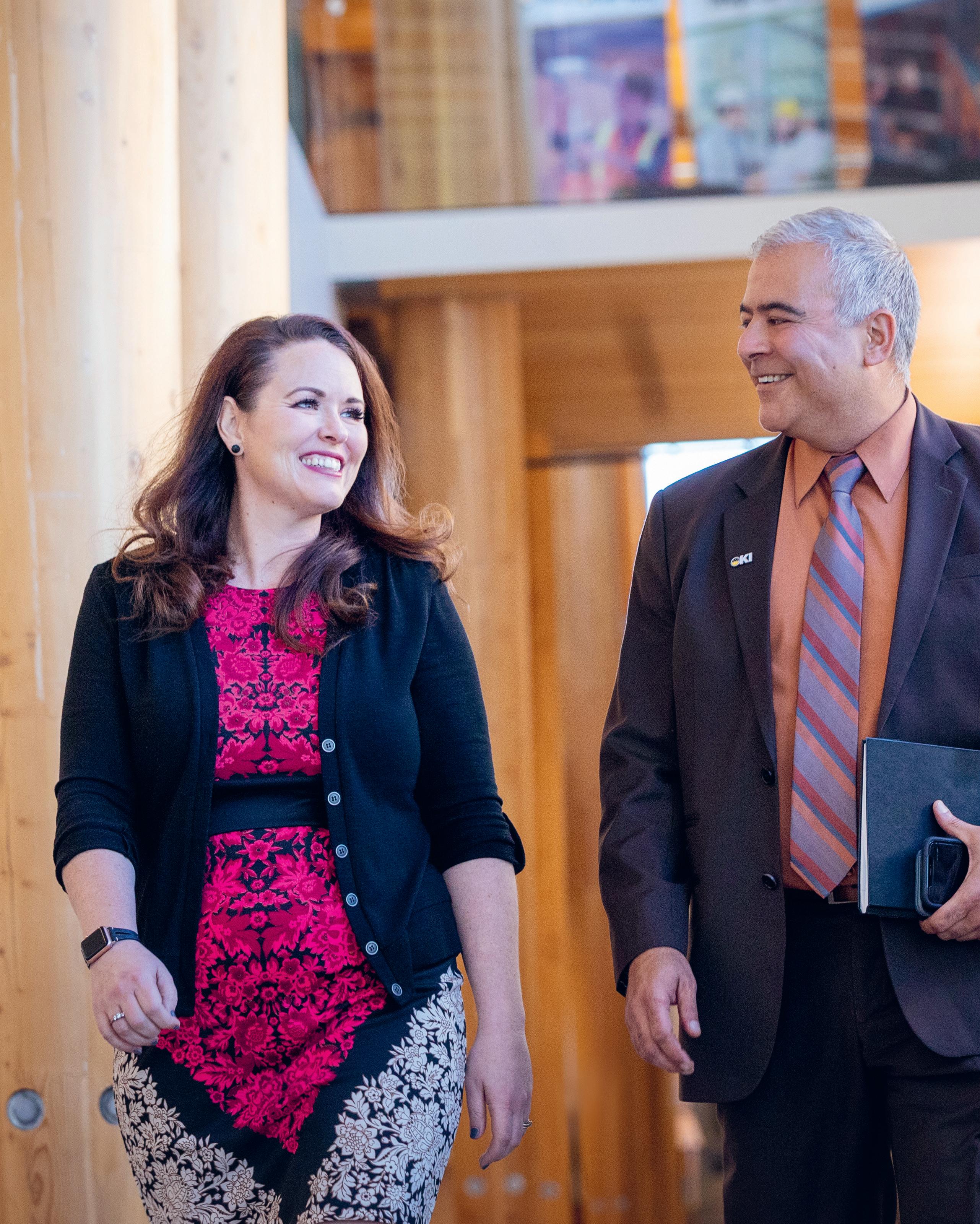
There is no shortage of research and data from around the world related to public safety and criminal justice; however, Fantazir sees Lethbridge College separating itself by working directly with these types of organizations to get a holistic view of the challenges they face and the opportunities they have for change and growth.
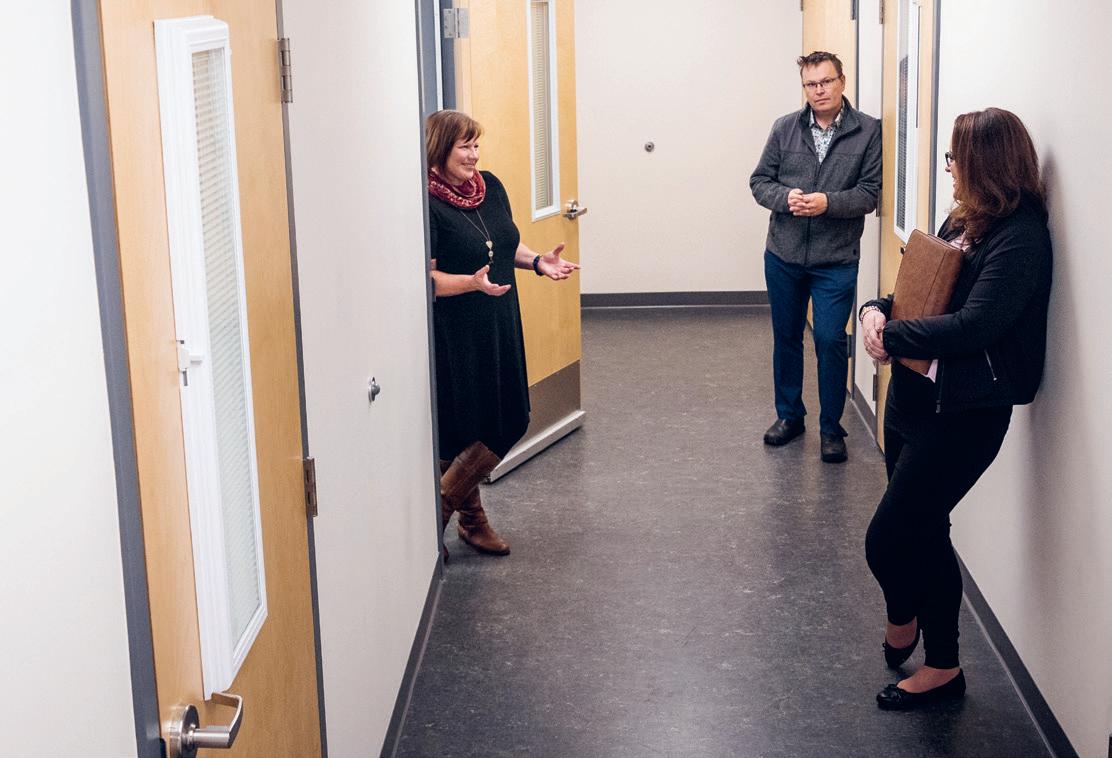
Fantazir says Lethbridge College’s researchers can help bridge the gap between academia and industry, not only identifying challenges, but bringing forward real-world, implementable solutions. The research team has found willing partners from across the country who recognize the value applied research projects can have on their work. “We’re working with a lot of small and mid-sized agencies who don’t have full research departments,” says Fantazir. “So, how can we help them?”
One such partner is in Manitoba, where Lethbridge College alumni Wayne Balcaen (Criminal Justice 1990) is the Chief of Police for the Brandon Police Service. His connections to the college give him confidence that Fantazir and the CPSAR team can make a difference in his work. “In today’s era of policing and public safety, it is paramount that research-driven solutions are the hallmark of future actions taken by police and programs developed within our service,” says Balcaen. “Data-driven research leads to informed systemic changes that will establish best practices in our profession.”
Balcaen’s involvement highlights one of the strengths Lethbridge College brings to the public safety research field – its five-decade commitment to training the public safety industry. Since offering its first Criminal Justice – Policing diploma program in 1969, the college has continued to expand its academic offerings, delivering both degree and diploma programs in justice, policing and corrections curriculum, as well as recruit and cadet training programs for partners. With 17 full-time faculty members in the School of Justice Studies and more than 70 employees in the teaching, training and research pool with various backgrounds and years of industry experience, the college is uniquely positioned to conduct research through the lens of those who have actively worked in the field.
CPSAR and its research team’s work moves Lethbridge College more firmly into the social sciences applied research space. A five-year, $1 million Mobilize grant received in October is part of the Government of Canada’s College and Community Innovation program, managed by the Natural Sciences and Engineering Research Council of Canada in collaboration with the Social Sciences and Humanities Research Council. It is the largest social sciences research grant in the college’s history.
As the work expands, new opportunities will present themselves for Lethbridge College employees and students to get involved in research. “We have a wealth of talented people, not only in those who are on-campus, but in our industry partners and alumni, who give us a unique view of the day-to-day life and challenges faced by those in the field,” says Trudi Mason, Dean, Centre for Justice and Human Services, adding that research opportunities will tie into the Justice Studies – Bachelor of Applied Arts program. “This research will benefit our industry partners, strengthen our ties with those who work in these sectors, and provide opportunities for our faculty and students to engage in research.”
Also core to the expansion of Lethbridge College’s justice studies research is a focus on Indigenous perspectives, another area Fantazir
says has too often been neglected in all areas of research. Over her first year and a half in her role, the CPSAR research team, in conjunction with the college’s Indigenous Services department, will focus on developing the First
Nations principles of ownership, control, access and possession – more commonly known as OCAP, to ensure the college’s research properly represents an Indigenous view. A committee will meet with Elders and other leaders from Indigenous communities and organizations to develop research parameters. “Before we even start on any specific research, we want to understand and build meaningful connections and relationships,” says Fantazir. “Research should be driven by our Indigenous communities, organizations and partners. Let them tell us what they need from us, rather than the other way around.”
Dr. Kirsten FantazirPresident’s Applied Research Chair in Public Safety
With multiple industry partners already on board, and an open invitation for others to come forward to discuss potential partnerships, Fantazir sees nothing but opportunities ahead as she and the School of Justice Studies faculty researchers strive to make a difference in the public safety sector.
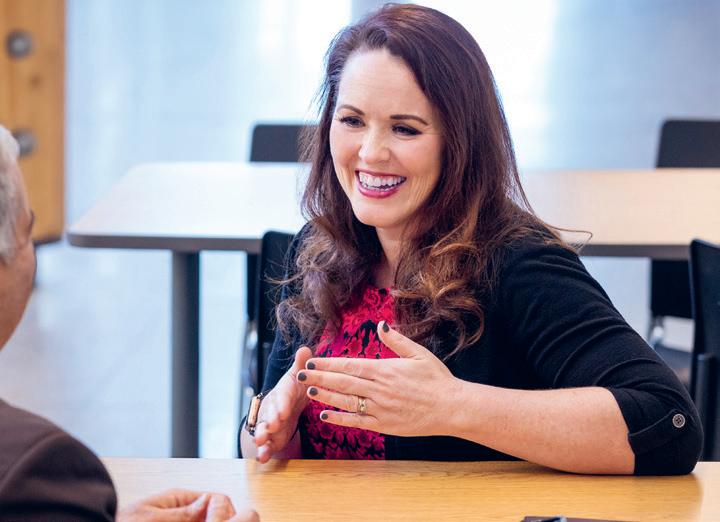
Being named Lethbridge College’s President’s Applied Research Chair in Public Safety represents a full-circle moment for Dr. Kirsten Fantazir. Growing up, she spent many hours on the college’s campus with her mother, Dr. Phyllis Day Chief, a long-time writing instructor, and Fantazir started her own post-secondary educational studies at the college, graduating from the General Studies program in 1999. After leaving the college, she went on to earn a Bachelor of Arts in Psychology, a Bachelor of Education, a Master of Education in Distance Education, and a PhD in Psychology, focused on studying post-secondary student engagement, motivation and retention.
Fantazir re-joined Lethbridge College in 2003, first as an instructional designer in the Centre for Teaching, Learning and Innovation, and then as a faculty member in the School of Justice Studies, a position she held from 2010 until moving into the research chair position in July 2022. She is an experienced researcher, completing multiple projects focused on exploring student motivation, engagement, retention, and social/teacher presence in non-traditional adult learning settings.
“Research should be driven by our Indigenous communities, organizations and partners. Let them tell us what they need from us, rather than the other way around.”
As virtual and augmented reality (VR/AR) development continues to grow, innovate and develop new technologies, the question being asked has subtly shifted from “what can VR do?” to “what can’t it do?”

“Anything is possible in VR,” says Mike McCready, Industry Liaison and Research Advisor, Spatial Technologies Applied Research and Training (START) Centre. “The key is matching the solution to the problem. Some may want to incorporate VR because of the novelty and look for problems that VR can solve. As partners come to us with specific problems, we work with them to identify if VR can solve them, and then if it can, we collaboratively develop a solution.”
McCready leads entrepreneurial and research activities in Lethbridge College’s START Centre. Created to partner with Alberta-based organizations to apply VR/AR technologies to solve challenges in key Alberta industries, including agriculture, energy, architecture, health care, cultural heritage and emergency response, the START team has worked with a wide variety of industry and community partners to use spatial technologies to create unique experiences.
One of the many projects the START Centre is working on is a VR driving simulator with the Lethbridge Police Service, which will be the first of its kind.

Some of the centre’s highest profile work to date includes creating an immersive paleontologist experience, highlighting the Grande Cache Dinosaur Tracks site with the Municipal District of Greenview; the CareGiVR project, which creates highly realistic virtual reality scenarios to help health-care professionals learn how to work with dementia patients; a training simulation prototype with ENMAX; and a VR driving simulator with the Lethbridge Police Service, which will be the first of its kind. And the demand continues to grow.
“In the past couple of years, there’s been a surge in the interest of partners wanting to work with us,” says McCready. “We’ve been averaging one to two clients per month reaching out to us, and it’s interesting because they’re all at different stages of readiness. One recent meeting was with a partner who is excited to get started after securing seed funding from Alberta Innovates. Another one is with a municipal government department and that call was much more exploratory about what we can offer and how VR/AR might be incorporated into their workflow. We’re getting these types of messages consistently, which shows the interest in START’s services.”
START’s ability to respond to these types of requests received a significant boost from a two-year, $900,000 federal grant announced in April 2022. The funding was administered by the Natural Sciences and Engineering Research Council of Canada through the College and Community Innovation program’s Applied Research and Technology Partnership grants. A total of 74 projects across Canada received funding, and Lethbridge College was one of only three institutions to receive the maximum $450,000 per year funding amount for a single-college project.
With the funding, McCready and the team in the Centre for Applied Research, Innovation and Entrepreneurship (CARIE) went to work expanding the START team, bringing in skilled scientists, researchers and developers who will allow START to respond quickly to industry needs. The team now includes a VR/AR machine learning researcher, Owen Brierley, PhD(c); a senior developer, Sujan Sooriyakumar; a project coordinator, Anamaria Turuk; as well as a one-year, full-time internship for a graduate of the college’s Virtual and Augmented Reality certificate program, Austin Hatch.
“The growing team will allow us to take on more projects, work with more clients and allow us to explore beyond our current capacity,” says McCready. “For example, I know what I want to do with regards to using virtual beings in virtual reality, but I don’t have that expertise. But Owen does and his expertise is going to allow us to do that.”
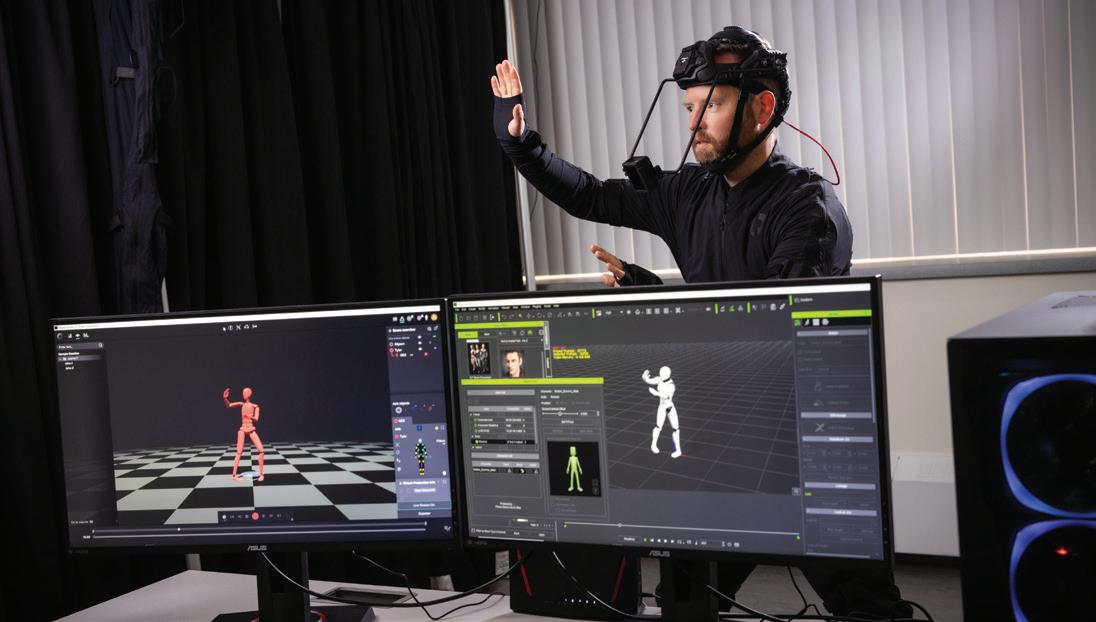
This grant is the second major funding boost for START in less than a year. The centre also received more than $410,000 from the Canadian Foundation for Innovation in July 2021, and a matching $410,000 grant from the Government
Some of the START Centre’s other projects include creating an immersive paleontologist experience, highlighting the Grande Cache Dinosaur Tracks site (above); and the CareGiVR project, which creates highly realistic VR scenarios to help health care professionals learn how to work with dementia patients.

of Alberta’s Research Capacity Program, which went to support infrastructure development.
Through those grants, START has been able to grow its inventory of cutting-edge equipment, including a full motion capture studio, which will be completed within the next year. While benefitting students in the college’s Virtual and Augmented Reality program and START researchers, the studio will also be a resource for others in southern Alberta needing access to the technology. “We are looking forward to creating access for industry to be able to use it, whether that’s an indie game studio or a small film production company that needs motion capture, we’re going to make that available,” says McCready.
With more grant applications submitted and countless ways to use VR/AR technology, START is just scratching the surface of ways it can support industry, students and researchers throughout the province.

“We want to be an accelerator – to increase adoption and implementation of spatial technologies to support our partners,” says McCready. “To have these partners and some
large and significant partners from around the province reach out to us is an indicator they recognize Lethbridge College is a leader in the space. They want our support, they want our resources and they want our talent to be on these projects. And that’s really exciting.”
As the VR/AR industry continues to grow in Alberta and beyond, Lethbridge College and the START Centre are ready to grow along with it.
Mike McCreadyIndustry Liaison and Research Advisor, Spatial Technologies Applied Research and Training (START) Centre
“We want to be an accelerator – to increase adoption and implementation of spatial technologies to support our partners.”

Strawberries and tomatoes are at the core of Sunterra Greenhouse’s operations. Growing fresh produce in Alberta-based greenhouses has a multitude of benefits, including increased freshness and quality for local consumers, less reliance on imported fruits and vegetables, and a sustainable year-round growing method focused on reducing the use of natural resources.
Lethbridge College has partnered with Sunterra Greenhouse to research and develop methods to support and develop Alberta’s burgeoning greenhouse sector. With ideal sunlight conditions and a strong agriculture industry, the province is well-suited to be a leader in greenhouse production. “Increasing our capacity to grow in controlled environments has import replacement potential,” says Megan Shapka, Lethbridge College’s director of Applied Research Operations. “Supply chain challenges during COVID really showed us that we can’t rely on strawberries from California, for example.”
The collaboration between Sunterra and Lethbridge College began in 2020, when the Government of Alberta transferred management of the Brooks Research and Production Greenhouse to the college. Sunterra was already a client in that facility, doing self-directed applied research on strawberry growth, including evaluating different berry varieties, growing methods and media. It was a perfect match with Lethbridge College, which has been involved in greenhouse, aquaculture and aquaponics research for more than three decades. Experts from the college’s Aquaculture Centre of Excellence and Centre for Sustainable Food Production met with Sunterra’s team and found they were kindred spirits with common goals, each committed to developing innovative techniques to optimize greenhouse food production.

“We immediately signed a research collaboration agreement to say not only could they stay in the greenhouse and keep doing what they were doing, but that we would seek to expand the work together and apply for external funding to do a bigger, more impactful project,” says Shapka. “What they really needed was pre-commercial validation of what they were doing, especially on the strawberries, for their commercial operation. Our facilities offer a place to test new varieties, technologies and techniques before they are employed in a commercial facility. We help de-risk innovation so that producers can make informed decisions.”
The agreement paid nearly immediate dividends, as Results Driven Agriculture Research (RDAR) awarded the college and Sunterra a $783,205 grant in September 2021 to support greenhouse production technology evolution, which can help determine the optimal conditions for growing quality, fresh produce year-round in Alberta. The grant is one of the largest ever awarded by RDAR.
“It’s a good news story,” says Ray Price, President, Sunterra Group. “We believe that for Alberta, agriculture is the future, and in a lot of ways it will be an economic growth driver. We have land, we have energy, we have people, and we have water, and we should be using those to feed not only Albertans but people around the world.”
Alberta’s greenhouse sector appears ripe for growth. According to Agriculture and Agri-Food Canada, in 2020, across Canada, there were over 18 million square metres of harvested greenhouse vegetables, but less than four per cent of that was in Alberta, trailing behind Ontario (72 per cent), British Columbia (17 per cent) and Quebec (seven per cent).
Sunterra is focused on leading the expansion of Alberta’s greenhouse footprint. With more than 50 years of agriculture history in the province, the company began researching and planning greenhouse development 10 years ago, culminating with the opening of the first phase of a large commercial greenhouse near Acme in 2021. With 20 acres of growing space, Sunterra has completed its first year of production in the facility, growing strawberries in 2.5 acres and tomatoes in 17.5 acres.
“We believe that controlled environment agriculture is the future of food production in Canada,” says Amanda Hehr, President, Sunterra Greenhouse. “There has been tremendous pressure in recent years on conventional global agriculture systems due to climate change, increased transportation costs and geopolitical instability. Food security is an important issue, and we’re thrilled to partner with Lethbridge College to innovate and optimize indoor strawberry grow systems with a focus on high density production.”
“Our facilities offer a place to test new varieties, technologies and techniques before they are employed in a commercial facility. We help de-risk innovation so that producers can make informed decisions.”
Megan Shapka, MEd Director, Applied Research Operations
Working alongside Sunterra, Lethbridge College’s role in this research collaboration is to help determine the optimal conditions for growing high-quality, fresh produce year-round in Alberta. In September 2022, that research received a boost as a group of researchers from the college, Sunterra and Meteor Systems was one of just 15 innovation teams selected from across Canada to explore new tools and technologies that will enable sustainable, year-round berry farming. The group received $50,000 from the Weston Family Foundation in the Homegrown Innovation Challenge to refine its pitch idea, build a team and create a full proposal for the next phase of the challenge.
The college’s proposal will test a new gutter system to maximize the number of strawberries that can be grown per square metre. The team hopes to move into the second phase of the competition, where 10 projects will be selected to receive $1 million each to develop and demonstrate a small-scale proof of concept.
It’s another step in what members of the college’s Centre for Applied Research, Innovation and Entrepreneurship (CARIE) team hope will be a long and fruitful partnership.
“We feel privileged to be helping Sunterra achieve its bold vision for greenhouse production in Alberta,” says Shapka. “This is a group of companies that has demonstrated for decades that it has its finger on the pulse on consumer preferences and trends. They’ve done their homework on the potential for and benefits of controlled environment agriculture in this province and they’re showing leadership in employing state-of-the-art technology, shortening supply chains and expanding on their admirable field-to-fork model.”
As applied research projects between the college and Sunterra continue to grow and evolve, the winner will be Alberta consumers, who will be able to see, feel, smell and taste the difference in their produce.
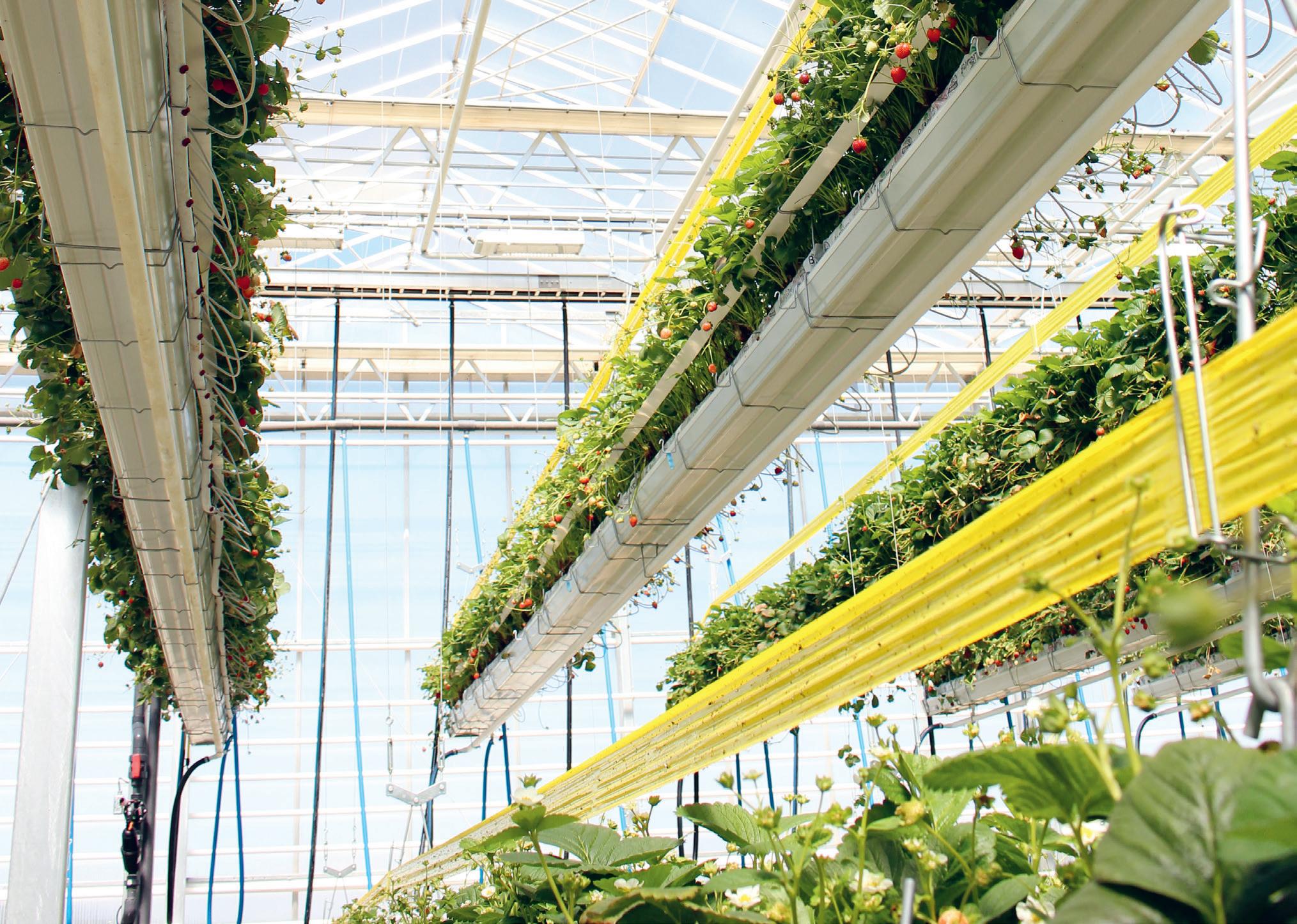


PEER-REVIEWED ARTICLES PUBLISHED IN 2021-22 BY RESEARCHERS CONFERENCE PRESENTATIONS IN 2021-22 BY RESEARCHERS

Lethbridge College is committed to developing the applied research capacity of faculty and staff members and funds short-term projects and activities that align with CARIE and college strategic goals and priorities. These projects are often a starting point toward a long-term vision and plan for applied research, including funding from external sources. Funding for faculty and staff projects comes from the Centre for Applied Research Internal Fund (CARIF) grants, while faculty can also access Social Sciences and Humanities Research Council (SSHRC) Institutional Grants to support small-scale research and related activities to strengthen research excellence and foster the professional development of students.
The CARIF and the SSHRC Explore and Exchange grants are core components of CARIE’s strategic framework for growing applied research by fostering, identifying, targeting and sustaining (FITS) research. FITS begins by fostering internal applied research capacity through small projects funded by CARIF and SSHRC. The next stage involves identifying research clusters (in consultation with deans) that emerge based on these projects. These clusters of expertise are then aligned with both centre and industry needs to ensure viability. If there is alignment, the next stage upscales the clusters by targeting external funding to secure dedicated capacity along with equipment and facilities. This stage also includes the development of three-to-five-year research plans in collaboration with industry. The final stage focuses on creating sustainability for the program through active business development and continued growth.
In 2022-23, CARIE is overseeing four CARIF grants and two SSHRC grants awarded to six different researchers. One recent CARIF-funded project currently underway is titled “Evaluating substrate preference and yield of blue oyster Pleurotus ostreatus grown on crop waste and food industry waste.” Lethbridge College agriculture instructor Dr. Adriana Morrell is working with a small team to create a Mycology Lab, which is focusing on beneficial, medicinal and gourmet fungi. Some of the key goals of the project are to promote sustainability in agriculture, develop collaborations between programs and encourage student involvement in mycology research. The team is testing various substrates to achieve high yield/quality with improved efficiency in oyster mushroom production, using agricultural and food wastes as substrates. They also are collaborating with Chef Mark Dieser and providing the college’s Culinary program with gourmet mushrooms. Dr. Morrell’s long-term plan is to apply for research grants to expand research lines, upgrade the Mycology Lab, provide students with ongoing research opportunities, and collaborate with industry partners.


Digital Communications and Media instructor Kris Hodgson-Bright
This applied research project focuses on Blackfoot Elders and Knowledge Keepers telling the story of the Battle of the Belly River, which took place in 1870 and is both a Provincial Historic Resource and a National Historic Event. It has been done in collaboration with the City of Lethbridge’s Indigenous Relations Office, the Galt Museum, the Lethbridge Historical Society and Blackfoot Elders and Knowledge Keepers from Kainai, Piikani and Siksika Nations. This project shares the Niitsitapi perspective on what transpired and the events (specific and overarching) that led to the battle. Traditional storytelling methods are enhanced with additional mediums including photogrammetry, a walking audio tour, augmented reality elements and/or a 360-degree immersive story.

 Justice Studies Chair Dr. Gary Barron
Justice Studies Chair Dr. Gary Barron
Over the 2021-22 academic year Dr. Gary Barron worked with a student research assistant to complete a literature review on the sociology of quantification regarding crime, policing and justice. The sociology of quantification continues to be an emerging field that seeks a unifying theoretical foundation, and examines the production of numbers in many domains, but they are under studied regarding crime and justice. In this second phase of his ongoing research program, he is starting a new project to examine how numbers related to crime and justice enter popular discourse. His research will address several questions: What interests, practices and rationales make metrics a popular tool in criminal justice? How do these practices and rationales affect how metrics are produced? What are the consequences of these processes in terms of the public good, individual agency, shaping of criminal justice and the organization of society? How do these play out in public politics?
General Studies instructor Dr. Simon Schaerz and program administrator Caylee Vogel
Physical exercise is defined as sequenced, planned, structured and repetitive bouts of physical activity, with the goal of improving or maintaining health. In addition to conferring strong physical health benefits, emerging evidence suggests that exercise positively affects brain function and health, but more research is needed. This study seeks to explore the effects of a 9-week exercise program on Lethbridge College students’ executive functions (i.e., inhibitory control, working memory, cognitive flexibility) and symptoms related to psychological ill-being (i.e., depression, anxiety, stress). It is hypothesized that the exercise program will lead to improvements in executive functions and protect against symptoms of psychological ill-being.
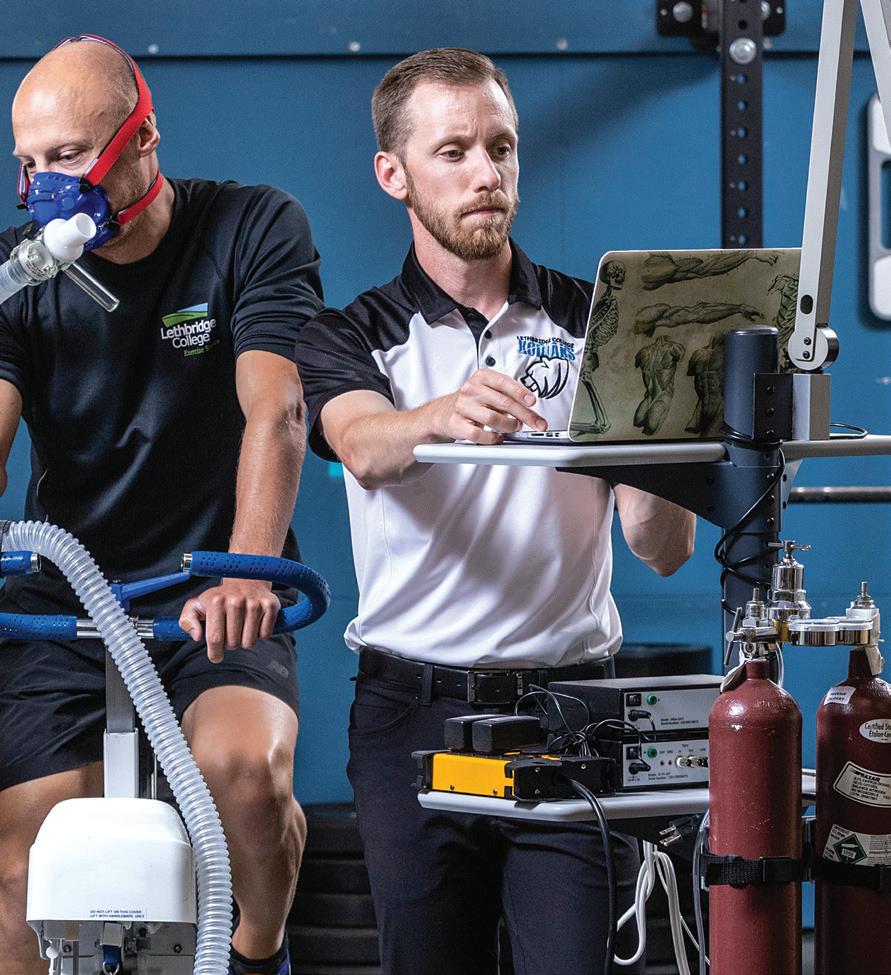
“Justice by numbers: the politics of quantification and statistics in the Canadian Justice System” by Justice Studies Chair Dr. Gary Barron
A separate and distinct component of the CARIF project described on the previous page, this SSHRC Explore project supports the work of a student research assistant to collect media and documentation related to statistics and metrics in the Canadian justice system.

“Sparking interest in literacy - author visits as a tool to enhance learning, motivation, and connection” by General Studies instructor Dr. Amy Hodgson-Bright. Several Canadian authors of children and young adult literature will be invited to Lethbridge College to speak to student writers in ENG1185 Writing for Children and Young Adults. Not only will this SSHRC Exchange grant enhance students’ experiences as readers and writers, but it will also help them construct knowledge around literary practices.
(Note: this project was originally approved in 2020-21 but was delayed due to COVID and then by Hodgson-Bright’s maternity leave. It will officially start in January 2023.)
1
The world needs to produce at least 50 per cent more food to feed a projected nine billion people by 2050. However, climate change and the depletion of natural resources present significant challenges. There is urgent need to develop alternative sustainable food production systems, reduce organic waste and improve the efficacy of food systems at commercially viable scales. Simply put, we have to produce more food, in less space, with fewer resources and with less impact to the environment.
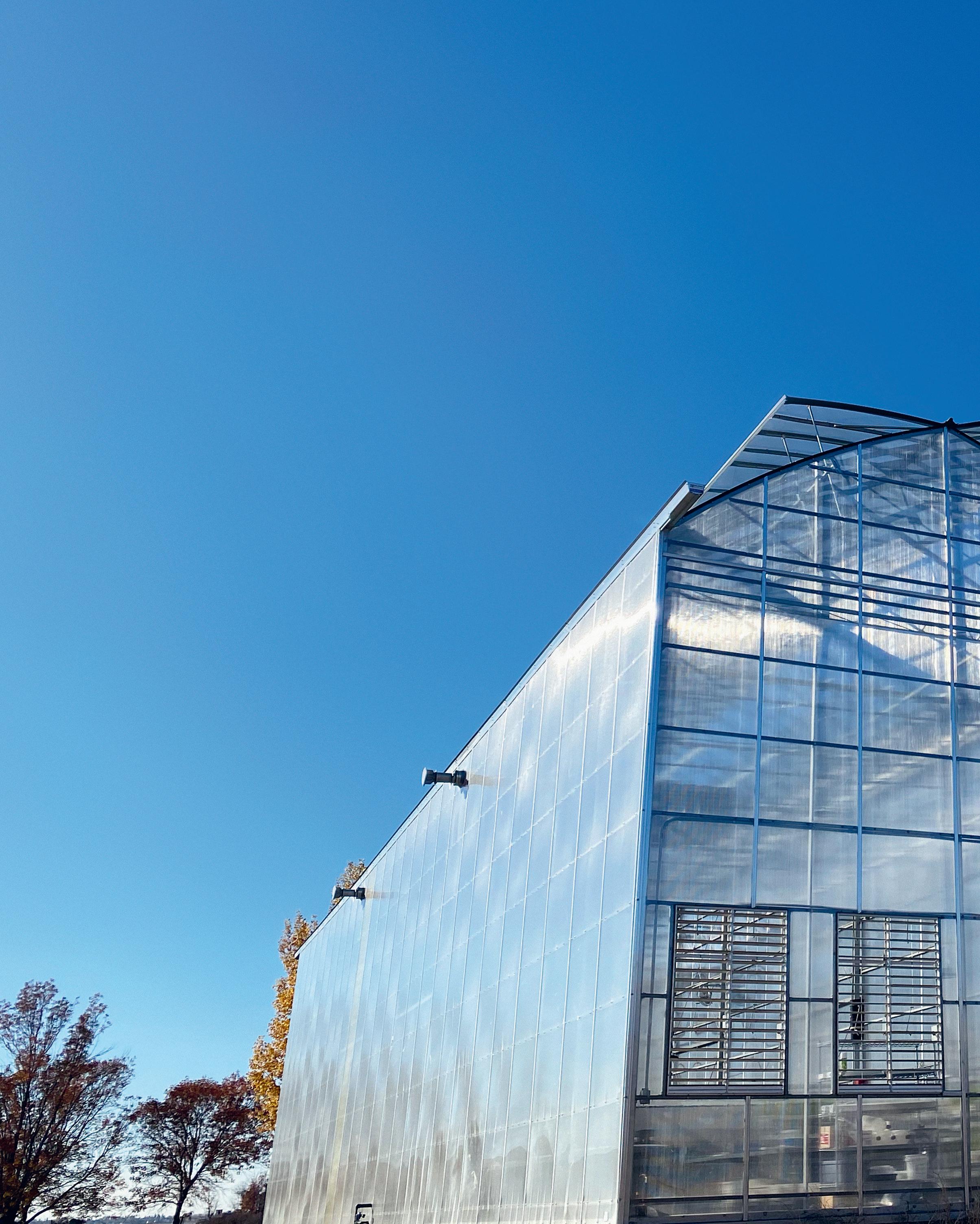

Efficient water management is simultaneously one of the greatest challenges and one of the greatest opportunities facing Alberta’s agriculture sector as it grows toward a sustainable future. A closed-circuit demonstration canal on the northeast corner of Lethbridge College’s Research and Demonstration Farm gives a real-world look at just how irrigation districts in southern Alberta are using advanced technologies to deliver water efficiently to farms throughout the region. The demo canal, inherited by Lethbridge College when the college assumed management of the farm from the Government of Alberta in 2020, consists of a recirculating water conveyance system where both the pipeline and open channel infrastructure are accessible for evaluating flow measurement technologies.
Along the pipeline, there are several measurement and control points, including six precast concrete panel control structures, four of which allow for the temporary installation of a wide variety of flow control and measurement components, and two of which have been fitted with automated control gates, which control water levels for diversions into simulated farm delivery turnouts or lateral channels. Originally conceived as a testing site for existing and emerging irrigation technologies, the demo canal now serves an educational purpose, providing a visual example of the types of flow measurement technologies being used across southern Alberta. Experts working on the farm can use the canal to demonstrate to visitors, including Lethbridge College students, the benefits and drawbacks of each type of technology, giving a close-up look at how producers are using technology to ensure efficient use of our area’s water resources.
A closed-circuit demonstration canal on the northeast corner of Lethbridge College’s irrigation demo farm gives a real-world look at just how producers in southern Alberta use advanced technologies to ensure efficient water use on farms.

Currently, the best way to find out whether a potato is good to go to market is basic and old-fashioned – cut it open and look to see if there are defects. The process is timeconsuming and destructive, taking good potatoes off the production line for random testing. A new research project at Lethbridge College aims to use cutting-edge near-infrared (NIR) hyperspectral imaging technology to test potato quality more quickly in a way that doesn’t destroy good product. Dr. Chandra Singh is leading the three-year, $523,300 project, which includes more than $400,000 in funding from Results Driven Agriculture Research (RDAR) and Alberta Innovates.
The project also involves a collaboration with University of Lethbridge research scientist Dr. Michelle Konschuh and in-kind contributions from Lamb Weston, Old Dutch Foods and the Edmonton Potato Growers.
The project uses an NIR hyperspectral imaging system and machine-learning techniques to detect quality parameters in potatoes, without destroying the samples. The major quality issues associated with potatoes are internal defects, greening, specific gravity (a measurement of the solids or starch content relative to the amount of water contained in a potato) and sugar content. The college previously acquired the technology that will be used in the project through a Natural Sciences and Engineering Research Council of Canada (NSERC) grant in 2021.
The project will identify the most significant wavelengths required to detect the quality parameters associated with potatoes. It will also test the NIR hyperspectral imaging system at speeds simulating commercial scanning speed and will eventually design a prototype for commercial application of the system based on extensive testing and analysis.
A new research project is aiming to help Alberta grain farmers cut their losses through improved storage technology and methods. The project, one of the largest and most comprehensive on-farm grain-drying studies to be conducted in Western Canada, is led by Dr. Chandra Singh, the Senior Research Chair in the Advanced Post-harvest Technology Centre (APHTC). Singh and his team will deploy wireless smart sensing technology to monitor in-bin grain storage conditions, including temperature and moisture levels, as well as an advanced automated fan and heater control system to dry the grain.

The three-year, $576,420 study is jointly funded by Alberta Wheat Commission (AWC), Results Driven Agriculture Research (RDAR), Alberta Innovates (AI), Canadian Agricultural Partnership (CAP), and Saskatchewan Wheat Development Commission (SWDC). Singh is currently looking for wheat farmers with on-farm grain drying and storage capacity of between 20,000- and 50,000-bushel bins to participate in this project.
If the project shows promise, the technology and best practices could also help farmers of other major cereal grains as well as oilseeds and pulses. Farmers interested in participating in this project are invited to contact Singh for more details by phone at 587-899-8405 or by email at chandra.singh@lethbridgecollege.ca.

When it comes to growing crops, every drop of water counts. Irrigation researchers at Lethbridge College have long been working on optimizing the amount of water needed to grow crops in a variety of fields, but new funding will allow the team to get a more accurate view of how much moisture is present below the surface, with a goal of allowing producers to adjust irrigation on the fly. This project is funded by Results Driven Agriculture Research (RDAR). Dr. Willemijn Appels, Senior Research Chair for the Mueller Irrigation Group, has received more than $420,000 for the new three-year project. The research will use microwave radiometer technology to create maps of the water in the soil that is available to plants and translate that data to adjust how much water is added through irrigation.
Appels has worked with Skaha Labs, the B.C. manufacturer of this technology, before while Skaha was optimizing the functionality of the sensor. The current version allows mapping of moisture variability in the top of the rootzone. By integrating this data with detailed point observations, this study aims to provide a more precise estimate of water requirements and take some of the guesswork out of irrigation. The three-year project takes place on the college’s Research and Demonstration Farm.
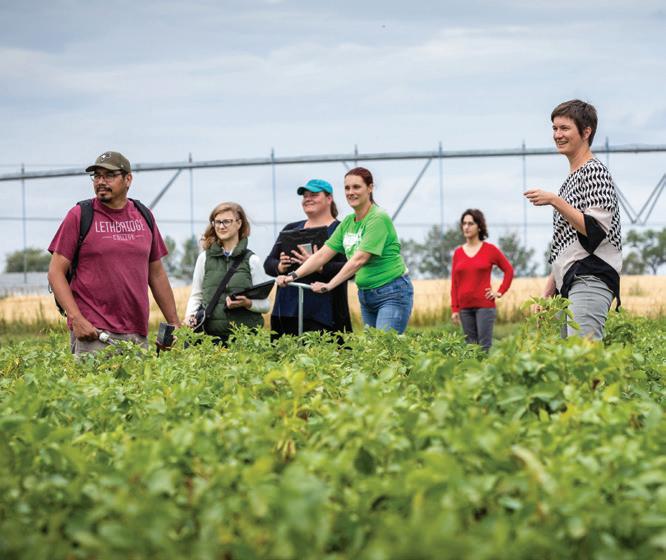
A growing research partnership with Southern Irrigation is set to provide valuable insight that could help producers maximize their crop production. The college and Southern Irrigation are studying the opportunities created by subsurface drip fertigation (SDF), a method that applies water and fertilizer directly to the rootzones of plants through regularly placed drip lines. In the summer of 2021, Lethbridge College and Southern Irrigation installed 15 acres of subsurface drip tape on 21 individually controlled zones at the college’s Research and Demonstration Farm.
The project is significant to this multi-year collaboration as it has graduated to a field-scale study after starting as a small-scale research project in three experimental soil bins inside the college’s on-campus innovation space. Lethbridge College’s research is led by Dr. Willemijn Appels and Dr. Rezvan Karimi from the Mueller Irrigation Group. This work follows an earlier project Dr. Karimi undertook on a commercial farm near Lomond, Alta., in 2019 and 2020. The first phase of the partnership is funded in part by a $105,500 grant from Results Driven Agriculture Research (RDAR) and the Canadian Agricultural Partnership (CAP) and will study SDF on two crops.

Traditionally, potato producers use the late fall – a time when their other crops require less attention – to prep their potato beds for the following spring. The long-established process has its benefits, but also creates concerns, including loss of fertile topsoil due to wind erosion, crop nutrient availability and an increase in greenhouse gas emissions due to large time lag between nutrient application and crop uptake. A new research project at the college will work to determine what steps can be taken to ensure the best result for producers, while also moving towards environmentally sustainable agriculture practices.
Dr. Rezvan Karimi, research scientist in the Mueller Irrigation Group, is heading the three-year, $446,500 project which is funded by Results Driven Agriculture Research (RDAR). Dr. Karimi’s team will test three different bedding formations – a traditional fall bedding, a spring bedding after having winter cover crop and a spring bedding with no winter cover crop – to see how each affects the yield, soil nutrient levels and nitrous oxide emissions. This is the first known project in Alberta to study the effect of potato bedding on soil erosion and emissions.


A new agreement signed by Lethbridge College and SVG Ventures|THRIVE will bring together entrepreneurs, industry experts and researchers to support Alberta’s agriculture sector. As a result of the new memorandum of understanding, the college and SVG Ventures and its agri-food innovation and investment platform, THRIVE Canada, will work together to accelerate the development and adoption of innovative solutions to support growth in southern Alberta’s agriculture and food sectors. THRIVE is comprised of top agriculture, food and technology corporations, universities and investors.
With a community of over 6,000 start-ups from more than 100 countries, the THRIVE platform invests, accelerates and creates access for entrepreneurs to scale globally to solve the biggest challenges facing the food and agriculture industries. By partnering with the college, THRIVE can connect agricultural-based entrepreneurs with the expertise in the college’s Centre for Applied Research, Innovation and Entrepreneurship (CARIE). Lethbridge College’s agriculture research includes the college’s Research and Demonstration Farm, greenhouse operations on the Lethbridge College campus and in Brooks, and research teams focused on irrigation, post-harvest technology and aquaponics. THRIVE will strive to partner with the college on opportunities for connectivity with start-ups that require testing and validation or follow-up through applied research projects.

Lethbridge College instructors George Gallant and Allyson Cikor set out to answer the question of how a little Hollywood magic can benefit independent filmmakers through a CARIFfunded project. The first step was identifying that the “magic” is actually just technology, in this case, a free video game design software program called Unreal Engine, which allows filmmakers to affordably create virtual sets for their productions. It’s the same technology used in productions like The Jungle Book and The Mandalorian. Gallant and Cikor worked with local director Charlie Christensen to create a short film with Digital Communications and Media students working as production crew members. The team filmed one version using traditional, on-location production and another through virtual production and then compared the results. The team’s main hurdles were understanding how the technology worked and the time it took to create an authentic virtual world. “It felt like we were building the landing gear of a plane as we were coming to the tarmac,” says Cikor. “But now that we can see it on the screen, I’m pretty impressed with what we managed to do.” The costs and time spent on the virtual production were higher than the traditional production, although they feel some of those can be mitigated by becoming more familiar with the technology and spending more time in pre-production. However, they were encouraged by the flexibility the virtual production presents.
Instructors George Gallant (left) and Allyson Cikor (right) used a free video game design software program to show how filmmakers can affordably create virtual sets for their productions.
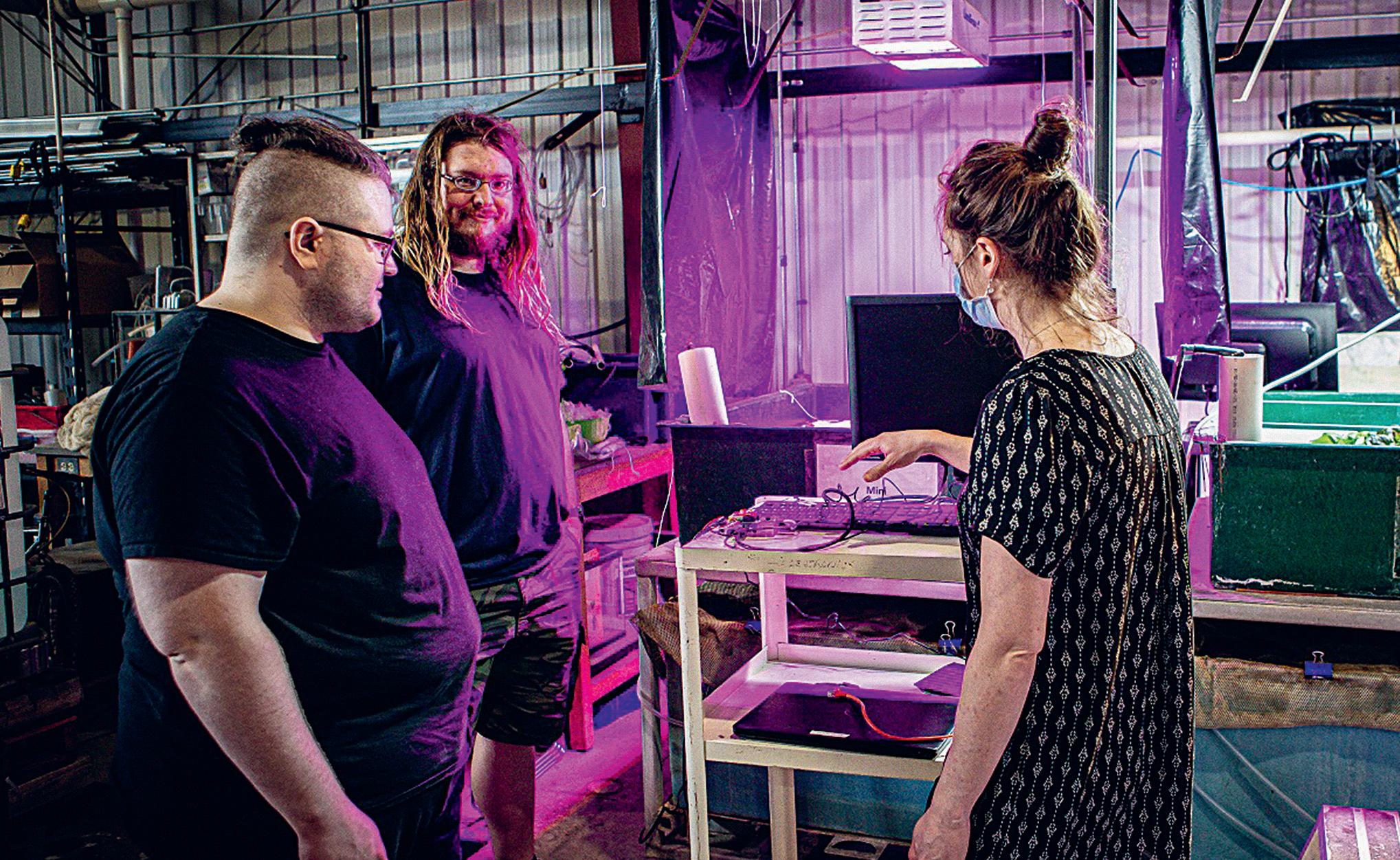
Students in the college’s Computer Information Technology (CIT) program got the chance to see how the real-world conditions in the Aquaculture Centre of Excellence (ACE) could provide a true test of the interfacing and networking skills they learned in class. In spring 2022, students worked in ACE instead of the usual computer lab, connecting a Raspberry Pi — a single-board, highly customizable computer about the size of a deck of cards — to a monitor, probes, router and wireless network. They tested these connections to ensure ACE scientists can access real-time data, directly or remotely, from the aquaculture system that runs 24 hours a day, every day of the year to keep both plants and fish healthy.
In addition, two second-year CIT students were hired as paid research assistants to support the project. Alec Anonson worked on the programming side of the project, writing and testing the Python programming language that can, among other things, send a real-time photo from ACE to wherever a member of the ACE team has internet connection. Keelan Hyde worked on the hardware, customizing the Raspberry Pi board to connect to other elements including data-collecting probes, and a series of LED lights to show the system is online and working.
The programming and hardware involved in this project owe much to the expertise of Shoja Mazidi, a CIT instructor. This collaboration also provides a solution to a real-world problem for ACE, which has gone through other systems for monitoring water acidity, dissolved oxygen, temperature and water levels, says ACE research associate Kristine Wilson. Their research findings may help pave the way for ongoing collaboration between CIT and ACE and create more work-integrated learning opportunities for CIT students in other areas of the college seeking a customizable tech solution. Gurpreet Singh, a researcher, and Dr. Nick Savidov, ACE senior research scientist, have also had a lead hand in this collaborative venture.
Research assistants Keelan Hyde (left) and Alec Anonson (middle) put the interfacing and networking skills they learned in class to work in real-world conditions in the Aquaculture Centre of Excellence, working with researchers including Kristine Wilson (right) and Shoja Mazidi.Lethbridge College’s Centre for Applied Research, Innovation and Entrepreneurship has grown exponentially in recent years, expanding from just 10 employees a few years ago to nearly 80 research chairs, scientists, associates, and assistants; postdoctoral fellows; managers; technicians; coordinators; administrators; and student employees this past year. Here are a few new faces on our campus:

Dr. Mohamed Naouri started his research journey in 2015 with a PhD in Agricultural Sciences focusing on irrigation innovation networks in the greenhouse horticulture field at CIRAD in Montpellier, France. Dr. Naouri’s research is focused on sustainable development, water management and innovation systems. He has published several research articles and book chapters on irrigation innovation systems, youth and agricultural development in the Mediterranean region. At Lethbridge College, Dr. Naouri is a postdoctoral fellow in the Mueller Irrigation Group as part of the RDAR-funded project “Creating maps of plant available water with microwave radiometer technology.” He is working with the irrigation science team to develop new and innovative methods to use the data for irrigation decision making. He enjoys finding innovative ways of using remote sensing technologies to improve water use efficiency and to contribute to the irrigation development sustainability in southern Alberta.
Dr. Selin Karatepe Yurdal earned her bachelor’s, master’s and doctoral degrees in Econometrics from universities in Turkey. Her doctoral thesis was on “European Electricity Markets: Integration and Interactions.” She has a strong background in stochastic processes and applied time-series econometrics. Her research focuses on data analysis for predictive modelling. At Lethbridge College, she is developing interactive software for Aquaponics businesses to be used as a visualization, for reporting, and overall, as a decision-making tool under uncertainty. Dr. Karatepe says “for every data-driven research project, it is critical to understand the nature of the field and the data-generating processes hidden in the available data. We must ‘allow the data to speak freely’ to comprehend it – to see how things are related to each other; to unveil the causal relations; to build models that have the predictive capacity.” She says the state of the art is evolving so fast, that is, there are always new things to learn, and she is enjoying that her work is evolving with the progress in the field.
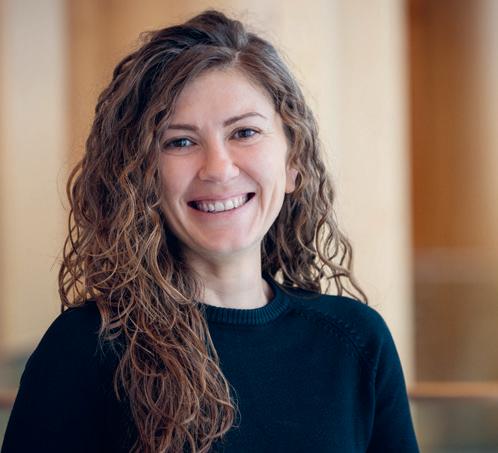
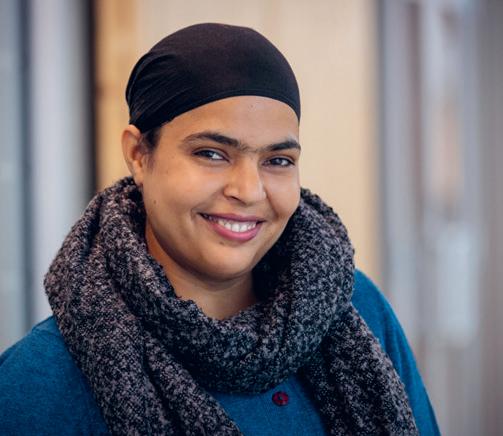
Dr. Rajpreet Kaur Goraya earned her bachelor’s, master’s and doctorate degrees in Food Science and Technology at universities in India. Her doctorate thesis was an industry-oriented project “Low sugar/sugar-free quality ice cream and whey beverages.” Dr. Goraya says she prefers doing interdisciplinary oriented research on post-harvest management in agriculture and dairy science. Her research projects included: post-harvest management, drying techniques, and economically viable public-private partnership research on various food commodities including long term storage stability. She has also trained thousands of farmers and young entrepreneurs. Her current research at Lethbridge College focus on applied science research to help the farmers, entrepreneurs and industries across Canada. She is enjoying the opportunity, as it will help industry professionals face upcoming market challenges by providing alternative solutions regarding their market establishment to develop a niche advantage over competition.
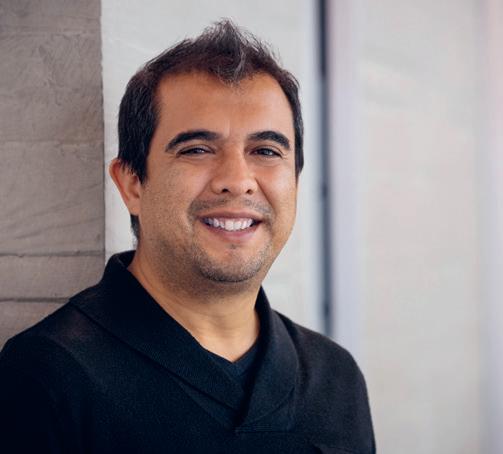
Dr. Jairo Salazar-Vazquez earned two bachelor of sciences degrees – one in Electronics and Embedded Systems and one in Information Systems – before going on to earn a Master of Science and doctoral degrees in Electrical Engineering from universities in Mexico. His research focuses on the use of artificial intelligence, robotics, electronics, optics, analysis of algorithms, data structures and hyperspectral image analysis to solve open problems in agriculture and aquaculture. He has also developed a real-time communication system for a critical application in driverless cars over rails. His current project at Lethbridge College focuses on the detection and identification of internal defects in potatoes by applying nondestructive methods. He enjoys the opportunity to help potato farmers to improve the quality of their products, reduce losses or increase profits with the use of innovative technologies.
Eric Stock earned his bachelor of science degree in Biology from the University of Lethbridge and a certificate of specialization in Fish and Wildlife Technology from Lethbridge College. Before starting work as the aquaculture facility manager at Lethbridge College in 2022, he spent more than 10 years working in aquatic research, including as an aquaculture and aquatic technician; a research, field and lab technician; and an aquatic research coordinator. He says he enjoys the challenge of figuring out new projects and working with his hands fixing equipment as well as culturing fish and plants. He says the community of people he works with are great, and he considers them an extension of family, which makes coming to work productive and enjoyable.

The Integrated Agriculture Technology Centre (IATC) was established in 2020 with a Technology Access Centre grant from the Natural Sciences and Engineering Research Council. The IATC supports Lethbridge College’s agriculture research teams, connecting them with small- to mediumsized enterprises and other clients who need high-quality, affordable research and development. The agriculture research teams at the college work in four key areas: aquaculture/aquaponics; greenhouse production; irrigation science and post-harvest technology.
As investment in Canada’s Premier Food Corridor skyrockets, the IATC has become a hive of applied agriculture research, helping agribusinesses and farmers increase profitability while minimizing environmental footprints. The research teams work with a diverse group of clients on projects ranging from small consulting contracts to large multi-year grants. In 2021-22, the IATC hired three new full-time staff: a manager, Autumn Barnes; a project coordinator, Alexis Buzzee; and an administrative assistant, Susan Amero. These three staff work to support project development, knowledge dissemination, reporting and administration.
Prior to joining Lethbridge College, Barnes spent almost a decade as an agronomy specialist with the Canola Council of Canada, driving collaboration and agronomy extension in the canola value chain. Before that, she had worked with Ducks Unlimited Canada and on mixed farms in British Columbia, Alberta and New Zealand. Barnes holds a bachelor of science in Agriculture Studies, is a Professional Agrologist and is passionate about food production and knowledge mobilization.
Buzzee first came to Lethbridge College in 2015 as the regional operations assistant before moving into an executive assistant role in 2018. Before that, she spent time in the municipal government sector in financial and community support roles. She holds a bachelor of arts in Anthropology and recently completed the graduate certificate in Science and Policy of Climate Change program through Royal Roads University. She is passionate about pursuing institutional and systemic climate action and sustainability.


Amero is a valued administrative assistant who serves as a critical support pillar for the agriculture research and administration teams at Lethbridge College. With many years of previous administrative experience, Amero hit the ground running when she joined the college in 2022.
One of the key activities of the IATC is promoting agriculture applied research projects, findings, and capabilities. Throughout this past year, the IATC held many private and public tours, including the first Farm Field Day, which brought in over 80 agriculture industry members to the research farm in July to learn about the agriculture-related research expertise and active projects at Lethbridge College. Contact the IATC iatc@lethbridgecollege.ca 403.320.3202 ext. 5729

A member of the CARIE team since 2009, Dave McMurray has played an important role in developing applied research capacity at Lethbridge College. Beginning with the Aquaculture Centre of Excellence (ACE), where he helped the team develop and receive its first NSERC grants, through to securing the college’s current NSERC-funded Integrated Agriculture Technology Centre (IATC), McMurray has supported researchers by finding the resources they require. Over the past three years, he has primarily focused on building out the research themes of Business and Technology; Justice and Public Safety; Health and Wellness; and Sciences, Social Sciences and Humanities.
Key areas McMurray has helped develop are the Spatial Technologies Applied Research and Training (START) Centre and the newly formed Centre for Public Safety Applied Research (CPSAR), which coincided with the appointment of Dr. Kirsten Fantazir as the President’s Applied Research Chair in Public Safety. McMurray’s day-to-day role includes quarterbacking the writing of major institutional grants (NSERC, SSHRC, CFI, etc.), engaging with internal and external stakeholders, and assisting researchers in the managing of grants and projects.
McMurray is also responsible for Lethbridge College’s internal research funding (CARIF and SSHRC) and provides oversight to the coordinators for the Animal Care Committee and the Research Ethics Board. In the spring of 2022, his role was expanded to include managing the operations of CARIE across all five themes in direct support of Megan Shapka, who is the Director of Applied Research Operations. Under this role, he leads our growing team of CARIE project coordinators.
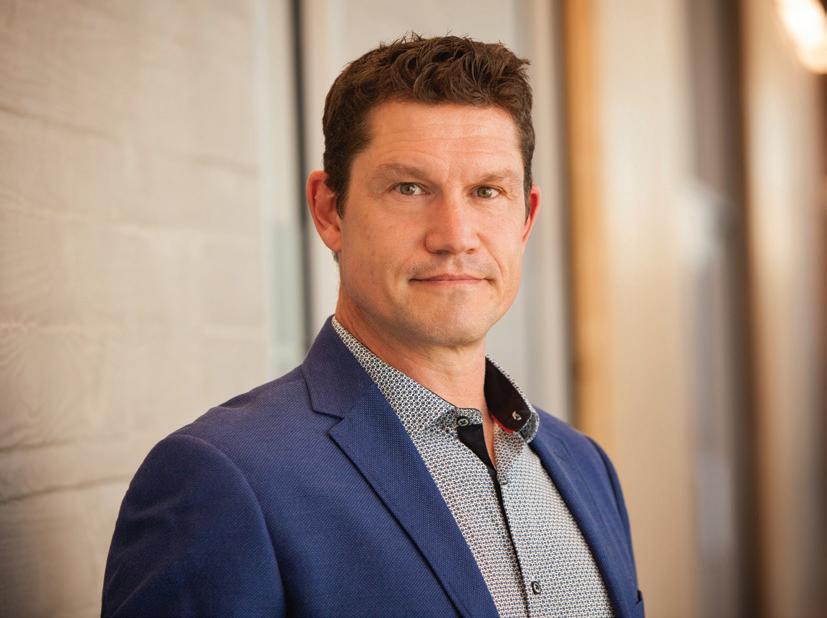
Dave McMurray, MA
Manager, Applied Research Operations appliedresearch@lethbridgecollege.ca 403.320.3202 ext. 5799
Prior to joining Lethbridge College as President and CEO in September 2022, I was already aware of the college’s reputation as a burgeoning applied research powerhouse. Word had travelled throughout Alberta’s post-secondary system about the work that was being done in irrigation, post-harvest technology, aquaculture, aquaponics and greenhouse production, virtual and augmented reality, and more. I was encouraged to know I was joining an institution that valued the positive effect applied research can have on industry and communities, and the opportunities it provides to researchers, faculty members, support staff and students.
Since arriving in Lethbridge, my understanding of the potential of the Centre for Applied Research, Innovation and Entrepreneurship (CARIE) has only grown. The creation of the Centre for Public Safety Applied Research is indicative of this potential as CARIE moves further into the social sciences research space, supplementing the great work already being done in our established research areas. I am proud of what our CARIE team, with support from across our institution, has accomplished as they work toward achieving ambitious growth goals while creating real-world solutions that support the local, regional and provincial economies.
Dr. Brad Donaldson, EdD Lethbridge College President and CEO
The United Nations’ Sustainable Development Goals are a call for action by all countries – poor, rich and middle-income – to promote prosperity while protecting the planet. As a member in the ImpAct initiative with Colleges and Institutes Canada, Lethbridge College and CARIE engage in campus activities that support the 2030 Agenda for Sustainable Development adopted by Canada and all UN member states in 2015.
sdgs.un.org/goals
This is the annual report of work done by Lethbridge College’s Centre for Applied Research, Innovation and Entrepreneurship (CARIE). Created by the college’s Communications, Marketing and CARIE teams, this publication aims to inform, educate and intrigue readers with stories and photos about Lethbridge College’s people and the innovative projects they have underway. For additional copies, email appliedresearch@lethbridgecollege.ca.
Publisher: Dr. Brad Donaldson
Executive editors: Dr. Kenny Corscadden and Megan Shapka
Co-editors and writers: Lisa Kozleski and Paul Kingsmith
Designer: Dana Woodward
Photographer: Rob Olson, Tanner Fletcher and Lauren Dale/Sunterra Market
Illustrator: Brent Bates
Centre for Applied Research, Innovation and Entrepreneurship 403.320.3202 ext. 5453 appliedresearch@lethbridgecollege.ca lethbridgecollege.ca/carie






